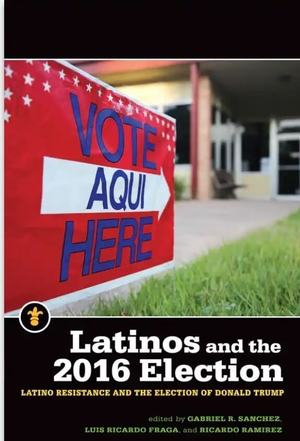There’s no question the Latino vote will be crucial in this year’s presidential election. But to understand the impact of Latinos in 2020, it’s helpful to step back four years, to the victory of a president who has made anti-Latino and anti-immigrant sentiment a staple of his presidency.
In their new book, Latinos and the 2016 Election: Latino Resistance and the Election of Donald Trump, co-editors and Notre Dame Professors of Political Science Luis Fraga and Ricardo Ramírez, along with Professor Gabriel Sanchez of the University of New Mexico, provide an in depth-look at the last presidential race and its unexpected outcome.

In a series of essays, researchers working at the intersection of Political Science and Latino Studies analyze issues ranging from Latino voter turnout in battleground states to the influence of gender on voting behavior. The book, published May 2020 by Michigan State University Press, contains 15 chapters written by 27 authors, as well as graphs and charts to illustrate the research.
“We think a book like this allows people to think very carefully about what to expect in the 2020 election, what to look for, and how to understand further what it means to have someone who is as anti-immigrant and anti-Latino as Trump in the White House,” says Fraga,
who also wrote the concluding chapter of the book.
Latinos and the 2016 Election was born out of a December 2016 conference convened at Notre Dame, according to Fraga. Over 40 scholars, funders, and people involved directly in the election debated the implications of Trump’s election and what it meant for the Latino electorate.
For Ramírez, it is the variety of contributors that sets the collection apart.
“Rather than focus on high-profile, more established faculty members, it recognizes that some of the most innovative work is coming from younger faculty who aren’t necessarily at R1 universities,” he said. “All together, we’re able to capture the complexities of the issues at hand.
“It’s not just about voting outcomes,” he adds. “The book is able to really dig deep and focus on all the diversity of the Latino community.”
One important finding from the book is that Latino voters participated at higher rates than they did in 2012, contrary to popular belief. Another is that, once again, Latinos overwhelmingly supported Democrats, even increasing their levels of support in the battleground state of Florida. Immigration remains the primary issue for Latino voters, and despite differences in region, gender and other markers, Latinos tend to express more similarities than differences in voting patterns.
Yet the rising prominence of Latino voters in electoral politics comes with its own set of potential difficulties.
For one, Latino voters confront what Fraga calls the “paradox of inclusion.” In essence, Latinos are in danger of being taken for granted as voters, particularly by the Democratic Party, given that their only viable opponents -- Republicans -- are known for their hard stance against immigrants and other policies relevant to Latinos.
In addition, the growing importance of the Latino vote is accompanied by an uptick in anti-Latino political advertising and rhetoric. The paradox of inclusion means that scholars must work hard not just to do the political science research but to theorize about the bigger picture implications, too.
“Although Latino voters have become more important and significant, scholars must take more active roles so we don't run the risk of just using Latino communities for our research and not contributing to their better integration into American society as well,” Fraga says.
*See the video recording of the authors discussing their book during a Sept 16 Hispanic Heritage Month event below